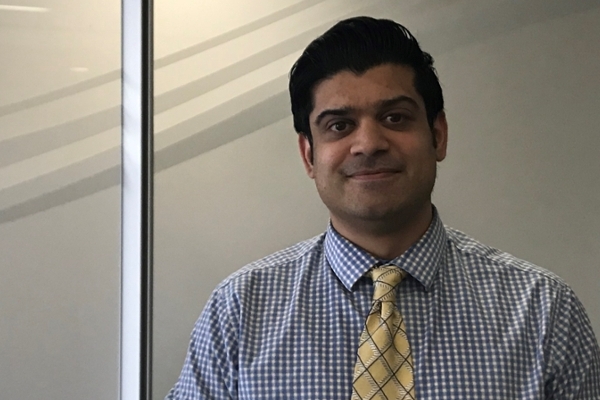Dr. Keith Da Silva’s affinity for children is what led him to pediatric dentistry, and it is the well-being of the youngest, and often the most vulnerable, patients that is his focus as both a researcher and a new academic.
Born and raised in Toronto, Da Silva earned a Bachelor of Science degree at Western University before moving to New York City for dental training at Columbia University. He completed his specialty training in pediatric dentistry at New York Presbyterian/Columbia University Medical Centre — thanks, in part, to a Columbia professor who identified Da Silva’s easy manner with children. Dr. Da Silva credits this easy manner and comfort with little people to the high school job experience he received at his mother’s home daycare. “We often think it’s children who are scared of dentists but, particularly early in their practice, it’s usually the dentists who are terrified.”
Back in Toronto, he spent eight years in private practice — often treating, and advocating for, children who face barriers to care. “I started to realize there were bigger problems that could not be addressed by treating one patient at a time. I wanted to have a better understanding of how to improve oral health at the community level.”
Cost, geographic location, and cultural beliefs are the three major barriers preventing individuals from accessing proper dental care in Canada. For many families without dental coverage, oral healthcare becomes a luxury service and less of a priority—especially in low income households. It becomes more difficult for families in northern communities as they must travel to major centres, which can be strenuous and costly. Additionally, some cultures don’t value oral healthcare the same way, as practices differ in other countries.
By beginning to work with municipalities on better programs, Da Silva was led towards the public health aspect of dental care. He wanted to develop a better understanding of barriers to accessing dental care by identifying how coverage programs are established and how they are funded. To find solutions to these issues, Da Silva embarked on a PhD in Public Policy at the Johnson Shoyama Graduate School of Public Policy (JSGS).
Da Silva knew eliminating access-to-care issues for children lies with policy makers more than with practicing dentists. “The challenge with dental health professionals is that they are great at collecting data, however they run into problems when trying to translate this data in a course of action that is palatable for governments.”
Currently, Da Silva is teaching in the pediatric pre-clinic and will teach a dental research course in the winter term at the University of Saskatchewan, as well as overseeing the Saskatoon West Dental Clinic and other outreach endeavours. He is already developing plans for an evaluation of community needs relative to Saskatoon West, “looking at ways to improve delivery, which is part of the issue of how we treat patients in our profession.” There has been a subtle shift across the health professions to an outcomes-based approach to care, he said, one that brings value to the patient beyond the standard treatment plan.
A part of his teaching will be an emphasis on communication with children and parents, he said. Long gone are the days of holding down children to work on their teeth “and dentistry has to adapt to new parenting styles. I want students to understand that while you have to respect your professional base, you need to find the balance between behaviour management techniques and taking parents’ concerns into account.”
In addition to his work in the Saskatoon West community, Da Silva is looking at developing programs specifically for children with Fetal Alcohol Spectrum Disorder (FASD), and at opportunities to engage northern communities in promoting strategies that connect healthy eating, and all of its benefits, with dental health. “We all believe oral health is part of overall health, and we all try to practice it — but there are a lot of structural barriers between the mouth and the rest of the body.”
Through his PhD program, Da Silva hopes to improve access to care for all Canadians, while contributing to the knowledge base in providing education for dental professionals on how to better present data to government. “I never expected a PhD in Public Policy to be something I would pursue, however I knew it was the right course of action for what I want to accomplish. I look forward to gaining a practical skillset in understanding different theories about decision making in government, and I trust the JSGS to provide this.”
